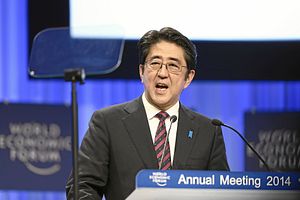On June 1, Japan’s Diet concluded its session. During the press conference following the conclusion of the Diet session, Prime Minister Shinzo Abe announced that his government has decided to postpone raising the consumption tax until the fall of 2019. He also announced that he would not dissolve the Lower House, making the upcoming Upper House election in July a referendum on his government’s policy.
His decision on delaying the tax hike was controversial. On one hand, it is by and large supported by the voters. The Japanese economy has continued to fail to bounce back after the initial consumption tax hike in April 2015, making many in Japan feel that another tax hike in the fall would further dampen an economy that is already losing steam. With the majority of the public opposed to the tax hike in the fall, Abe’s decision is by and large accepted.
On the other hand, as Abe himself admits, his decision not to raise the consumption tax next year goes counter to the commitment he made as a critical component of his government’s effort to put Japan’s fiscal house in order. His decision to delay the tax hike until the fall of 2019 essentially burdens his successor with paying for the decision he made on June 1, with the real prospect of further aggravating Japan’s already unhealthy fiscal condition. In short, his decision may alleviate the concerns of the voters of today, it could be creating an even bigger problem for the voters of tomorrow.
The opposition seems determined to somehow leverage Abe’s decision to postpone the tax hike, pointing to it as the proof of the failure of Abenomics. However, they have not gained much traction so far. The Democratic Party (DP), founded in March 2016 through a merger between the Democratic Party of Japan (DPJ) and the Japan Innovation Party, kept familiar DPJ names and faces on as leaders.So far, the DP has failed to convince voters that its leaders are serious about revamping the party into one that can offer a viable alternative to the Liberal Democratic Party (LDP)-Komeito coaltion. In fact, most voters probably cannot tell the difference between the old DPJ and new DP. With the prospect of the DP aligning its policies with other smaller opposition parties, including Social Democrats and Communists, and continuing to criticize the ruling coalition merely for the sake of criticizing, Japan’s major opposition party continues to marginalize itself.
Japanese voters deserve better. The upcoming election indeed ought to be a genuine referendum on the Abe government. Since the last Lower House election in 2014, the Abe government has made many decisions that are critical for Japan’s future. Defense reforms (including the enactment of the Peace and Security Legislation), the conclusion of negotiations for the Trans-Pacific Partnership (TPP) trade agreement, the postponement of the consumption tax hike—these are all highly divisive, yet critical, issues for Japan’s future. If unhappy with the Abe government’s decisions on these issues, voters should be able to cast a protest vote that can lead to a meaningful change. In other words, the current political environment should make the opposition more competitive in the upcoming election.
Sadly, though, it will not be that way. As the most recent poll suggests, even with the decisions on these divisive issues, Abe still enjoys a high approval rating of over 55 percent, with the LDP’s support rate at 39 percent. In stark contrast, the support for DP hovers at 7.3 percent, which is noticeably lower than the support for the old DPJ. The rest of the opposition does not fare much better in support from the voters. When the support for the LDP and Abe pulls this far ahead, the voters’ choice becomes one of “stability vs. the unknown” rather than a question of which party’s policy to support.
DP (and former DPJ) leader Katsuya Okada criticizes the Abe government for “high-handedness.” Maybe so. But the opposition parties only have themselves to blame for their inability to go beyond “just saying no” to the LDP. They have missed the chance to engage the government in a serious discussion to challenge its policy.
































